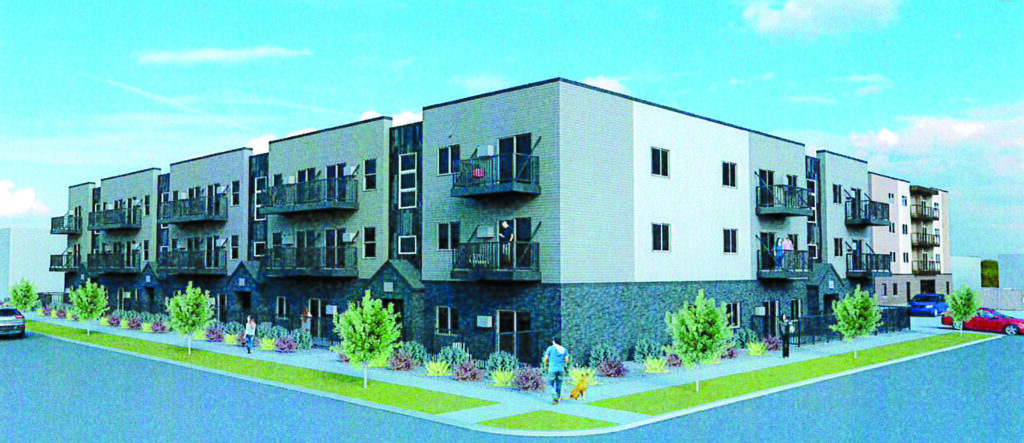
Kevin Bartram’s proposed Block 37 Flats apartment project directly west of Hornbacher’s at 113 10th St. S. received a Renaissance Zone property tax exemption from the Moorhead City Council. It brings to 293 the number of apartments added, permitted or in planning stages for downtown.
Nancy Edmonds Hanson
A little over two years ago, the Moorhead City Council accepted a recommendation by Downtown Moorhead Inc. and its supporters to set a goal of adding 500 rental units in the heart of the city. Economic development administrator Amy Thorpe told members Monday that, with their approval of the latest applicant for a Renaissance Zone tax exemption, Moorhead is more than on track to achieve that goal.
The latest development to earn the multi-year pass on property taxes is the Block 37 Flats, a 28-unit apartment building proposed by developer Kevin Bartram. The new structure to be built at 113 10th St. S. is directly west of Hornbacher’s and adjoins Bartram’s earlier 9Thirteen Lofts, built in 2018. The three-story walk-up building houses a mix of one-, two- and three-bedroom apartments, with enclosed parking on the first floor. Total cost is estimated at $4.9 million.
Thorpe pointed out that Moorhead’s downtown revival goal to increase the number of residents is ahead of schedule, with 162 new units completed, 33 projects already permitted this year, and another 101 apartments under development, with permits expected later this year. “That’s 60% of our goal,” she said.
The Renaissance Zone tax exemption eliminates tax payments on the construction (but not the property on which it stands) entirely for the first five years; 75% in years six through 10, and 50% in years 11 through 15.
Council members Deb White and Larry Seljevold complimented the developer on his responsiveness to the owners of older homes in the area. Several adjustments have been made to the original plan, White said, based on neighbors’ concerns.
Border credits boosted
The council approved another tax issue presented by Thorpe – increasing the workers compensation premium rebate that the city grants Moorhead businesses. The rebates are funded through Moorhead’s share of Border City Enterprise Zone funding approved by the 2019 Legislature. The state funds are intended to offset the differential between North Dakota and Minnesota rates. Moorhead now receives about $520,000 annually from the program, which has become a permanent part of the state’s budget.
Thorpe reported that 111 Moorhead businesses received total credits of about $365,000 last year, the lion’s share of the allotted funds. Last year, the tax credits were limited to 20% of their workers compensation premiums up to a cap of $25,000. Council members accepted the Economic Development Authority board’s recommendation to increase the percentage to 25% and the cap to $30,000 for the 2020 program year.
The city’s businesses have received a total of $17 million in credits from the Enterprise Zone program, which is in its 36th year. Thorpe said her department receives from 110 to 130 applications per year from the 200 companies that qualify.
Acting city manager’s goals
Acting city manager Dan Mahli thanked councilors for making his first meeting in the first role a pleasant experience. He took the reins of city government after former manager Christina Volkers’ departure for a new job in Oakdale, Minnesota, June 28.
He briefly identified his priorities for the coming months, while the city advertises and pursues a permanent replacement for Volkers. Among them, he said, is working with the staff to develop the 2021 city budget while ending 2020 under budget. He noted, “We’ll be rolling into next year with a revenue forecast that’s not great.”
Other priorities include negotiations with the five unions that represent city workers and COVID-19 related matters, including conducting elections in August and November under safe conditions and dispersal of CARES Act funds for related expenses and losses by city government, businesses and other local organizations. Moorhead has just received $3.2 million in funding disbursed by the state. A task force will determine how the money will be allocated between now and the Dec. 31 deadline.


